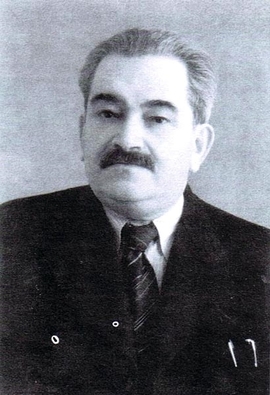Lurie Solomon (1890–1964) – specialist in Classical philology, translator, historian-antiquarian, historian of science.
In 1909, having graduated from gimnasium in Mogilev with a gold medal, he entered the Classical Department of the Historical and Philological Faculty of the St. Petersburg University. After graduating fro it in 1913, he stayed at the same Department to prepare for an academic rank. From 1917 to 1919, Ass. Professor at the Petrograd University and employee of the Archive of the Revolution. From 1919 to 1920, Professor of the Department of the History of Greek Literature, Samara University. From 1921 to 1923, Professor of the First Higher Pedagogical Institute in Petrograd. In 1923-1925, Ass. Professor of the Faculty of Social Sciences of the Petrograd University; from 1925 to 1927, Ass. Professor, and then Professor (until 1929) of the Faculty of Linguistic and Material Culture of Leningrad State University.
Since 1929, due to the abolition of teaching ancient history in the system of higher education, L. was dismissed from the university and, until 1934, taught Mathematics in secondary technical educational institutions of Leningrad. From 1932 to 1941, he served in various institutes of the Academy of Sciences of the U.S.S.R. (1932–1935, Senior Researcher at the Institute of History of Science and Technology; 1935–1939, Full Member of GAIMK; 1937–1941, employee of the Leningrad Branch of the Institute of History).
In 1934, he got the degree of Doctor in History without defending a thesis. From 1934 to 1941, Professor of the Department of the History of the Ancient World, Faculty of History, Leningrad State University. From October 1941 to December 1942, in evacuation - Professor and Dean of the Faculty of History and Philology of the Irkutsk University. In January 1943, he returned to the Leningrad Branch of the Institute of History; and in 1944, he became again Professor at the Department of the History of the Ancient World, Faculty of History, Leningrad State University. In 1944, he defended his thesis for the degree of Doctor in Philology; and in 1945, he was transferred to the Department of Classical Philology of the Philological Faculty of the Leningrad State University. On July 1, 1949, during the period of the ‘struggle against cosmopolitanism’, he was fired out from the Leningrad State University for ‘ideological mistakes’. In 1950-1952, taught Latin and general linguistics at the Odessa Institute of Foreign Languages, and then, from 1952 until the end of his life, he was Professor at the Department of Classical Philology at the Lvov University.
L. did not purposefully study the history of religion, but many of his works are of great importance for religious studies and philosophy of religion. First of all, these are his works on the history of Classical science, atomism and ancient social thought, including studies on Protagoras, Democritus, Aeschylus, Aristophanes, Euripides, Menander, as well as translations of ancient and modern European authors (Xenophon, Plutarch, F. Bacon). In the early period of his work, L. studied the ancient history of the Jewish people and was interested in the Biblical studies, having published several articles in the journal ‘Evreiskaya starina’ (Jewish Antiquity; 1924-1928) and in the collection of articles ‘Jewish Thought’ (1926), wrote a work on the history of anti-Semitism in the Classical world, in which he criticized the theory of economic explanation of anti-Semitism, and, considering this phenomenon historically unchanged, saw its cause in the so-called Substantialism, that is, in the characteristics of the people as it is, without its own territory and differed in their spiritual appearance from others.

